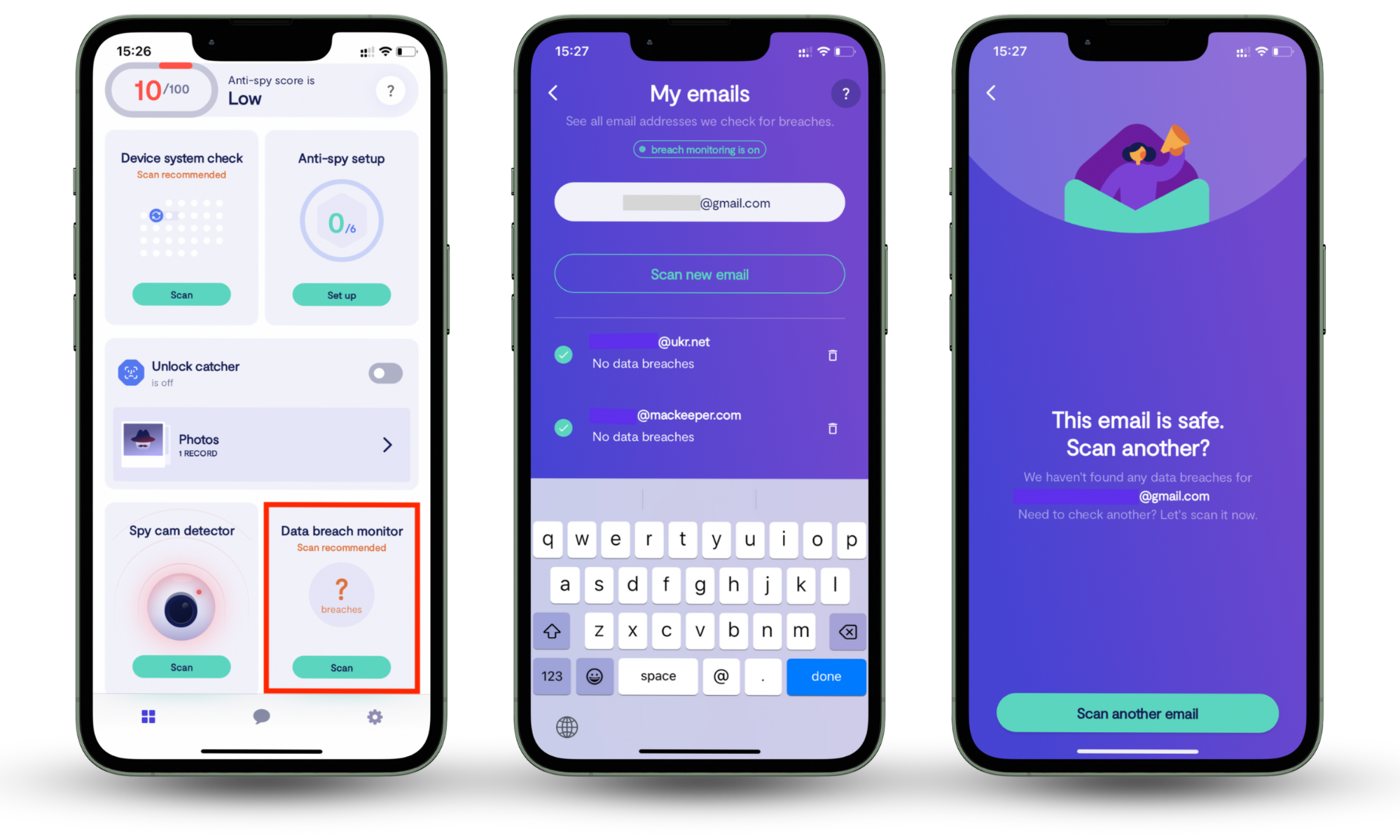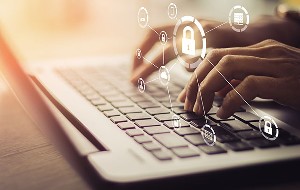Table of contents
- What personal data has been leaked?
- How to perform a Facebook leak lookup
- Facebook data breach: what to do?
- Change email and Facebook password
- Use a 2FA app for your email
- Consider changing your phone number
- Familiarize yourself with the most common Facebook scams
- Safeguard your data and your private conversations
- Encrypt your data with a VPN
- Conclusion
What personal data has been leaked?
The leaked Facebook data includes information like:
- First and last name
- Location
- Phone number
- Email address
- Occupation
- Date of birth.
How to perform a Facebook leak lookup
Several sites can perform Facebook leak checks, but you should use a reputable data breach monitor to check if Facebook leaked your information.
Clario Anti Spy's Data breach monitor will tell you if your email has been compromised in any high-profile data breaches with a quick Facebook leak search.
To check if your Facebook data was leaked, follow these instructions:
- Download Clario Anti Spy and create an account.
- Open Data breach monitor from the dashboard.
- Enter the email address linked to your Facebook account.
- Tap Scan to check for breaches.
- Review the list of leaks found and follow the recommendations to secure your accounts.

You can also download your data from Facebook to discover additional information that Facebook knows about you, including private messages, advertising lists, and more.
Facebook data breach: what to do?
If your information was leaked in a Facebook data breach, or any other breach, follow these tips to enhance your online security and protect your private data.
- Change email and Facebook password
- Use a 2FA app for your email
- Consider changing your phone number
- Familiarize yourself with the most common Facebook scams
- Safeguard your data and your private conversations
- Encrypt your data with a VPN.
Change email and Facebook password
The first thing you should do upon discovering your data has been leaked is to change your email and Facebook password. Set up strong, unique passwords for your email and your Facebook account (these should be different).
To strengthen your password, use a combination of capital and lowercase letters, numbers, and special characters.
Another thing you should ask yourself – is sign-in with Google safe? When you sign in with platforms like Google and Facebook, rather than creating your own login, you open yourself up to any vulnerabilities that those platforms may be prone to.
Use a 2FA app for your email
Too many emails have been leaked in data breaches, and this isn’t going to stop any time soon. Make sure you have two-factor authentication (2FA) set up for your email. Most email providers have 2FA options that you can set up, like SMS verification, touch notifications, and a secondary email address.
You can also set up a 2FA app –like Google Authenticator – that you can link to personal accounts, like your Facebook and Gmail. These apps can then generate a code that you must provide to log into your accounts.
Consider changing your phone number
If your email was leaked in the Facebook data breach, your phone number likely was too. So consider changing your phone number to avoid spam calls and potential hacks on Facebook.
Familiarize yourself with the most common Facebook scams
When hackers get your email through data breaches, it becomes more prone to receiving scam emails. You may receive scam emails to your leaked email address, or your Facebook account may become prone to receiving various scams. These scams can include viruses that are spread through links in Messenger or your email. Make yourself aware of these scams to avoid a Facebook virus.
Here are some of the top Facebook scams you should be aware of:
- Cloned accounts. Hackers may clone your account and try to reach out to your friends and family to get them to click on spammy links or send personal information via Messenger. If this happens, notify your friends immediately so they don’t fall victim to this scam.
- Money scams. A hacker may add you as a friend on Facebook and try to get to know you as a friend or romantically. When you finally begin to trust them, they’ll try to get you to send them money. So only add people you know as friends.
- Fake links. You may receive fake links via Facebook Messenger or email (if your email was leaked). The links in these emails often lead to spammy websites where you will potentially download malware. Even if it comes from a friend, be cautious of links that you are unfamiliar with.
Safeguard your data and your private conversations
Use a secure messaging app to enhance the security of your private conversations with friends, family, and colleagues. Secure messaging apps encrypt your messages so third parties can’t spy on your conversations.
Encrypt your data with a VPN
Use a powerful VPN to encrypt your online data and add even more security to your everyday conversations, browsing, and online activity.
A virtual private network (VPN) creates a secure tunnel between your device and the Internet. It hides your IP address, scrambles your traffic, and makes it much harder for outsiders to trace your online activity or intercept sensitive data. While Clario Anti Spy doesn’t include a VPN, it offers a more subtle Virtual location feature for people concerned with stalking. Pairing it with a reliable service adds another layer of privacy.
Here are some popular VPN options you can check out:
- Proton VPN
- TunnelBear
- Windscribe
Using a VPN alongside Clario Anti Spy’s Data breach monitor ensures you stay protected on two fronts: your traffic stays private, and you’ll know if your accounts are exposed in a leak.
Conclusion
Keeping your data private is critical to your online security. While some data breaches are inevitable, you can always take precautionary measures to protect your personal information and keep hackers at bay.
Run your email through Clario Anti Spy’s Data breach monitor regularly and follow the best practices I’ve outlined in this article to protect yourself from current and future data breaches.


